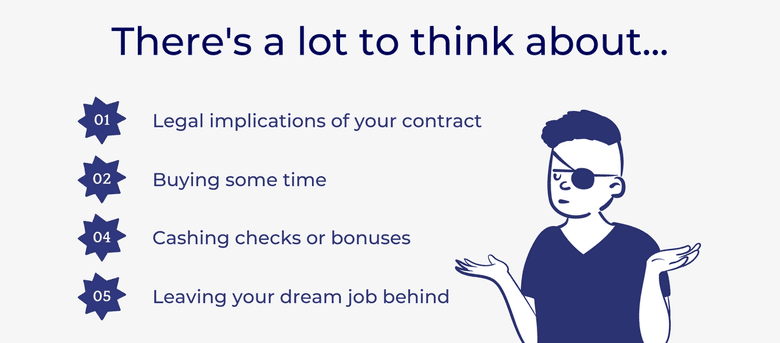How do I renege on a job offer after signing?
You signed an offer letter, told everyone you' re starting... but now you've changed your mind. Learn how to navigate your exit tactfully.
Whether you just signed your offer letter or you're a few weeks into a new job, things can happen to change your mind and make you want to leave. Maybe you just got an offer from a company you like more, perhaps you didn't negotiate salary, or maybe the new job is not a fit — regardless of the reason, it's important how you navigate this situation. Don't burn bridges that can be useful later on.
Is This the Right Thing to Do?

Legal Implications
Pull up your contract and look through it carefully: make sure you understand fully what you've signed and agreed to. If you have taken a bonus, benefits, or other cash or material gifts from your new employer — you might be liable to return those. If an employer is helping you with immigration, your case will likely be void if you decide to not take the job.
If you signed an employment contract, then you likely also agreed to some noncompete clauses. In most states, they are hard or impossible to impose but if you are a high-value hire trying to get out of a contract you just signed to go to a competitor, an employer might take legal action just to spook you or the competitor and avoid future poaching.
Other Considerations
- Think it through: If you have signed an offer but not a contract, you can buy yourself some time and delay contract signing if you still need time to make up your mind.
- Don't cash checks: If you're even remotely unsure about the opportunity or think you might decline, don't cash any checks or take any benefits until you're fully committed.
- Be careful with hedging: If you took an offer from your backup list but still have hope that Google (your dream job) might call you in the last moment, be realistic that you might piss off your new employer and burn bridges.
How Do I Do This?

In short — fast. Make sure you reach out to your recruiter or HR as soon as possible once you've made your decision and share only the information that they need from you. Be especially careful not to rub it in their face that you're leaving for a competitor.
If you know anyone who will be great for the job, you will score major bonus points by recommending them.
Call, Then Email
This is a conversation that you will ideally have in person or over the phone and then follow up with an email. It is deeply disrespectful to only do it in writing and cut the cord; it will cause unresolved negative feelings on the other side.
In the Call, Clarify That...
- You are rescinding the offer effective immediately and you will follow up in writing
- Express gratitude for the opportunity to get to know the company
- Let the recruiter know they were stellar but this is just not the right fit
- If there were red flags, be honest
Do not mention you took another offer or want to go to another company, even when asked directly. Just say "I'll continue looking for a better fit. Would love to grab coffee once I land somewhere".
Also, be prepared to receive a counter-offer to reconsider and make sure you know what your bottom line is. If your main motivation is money, then you might consider negotiating instead of declining the offer.
After the call, we recommend sending a plain email confirming your intentions (this is mostly for your records) and a thank you card to the recruiter and/ or hiring manager.
A Very Rough Template for Your Email...
(Recruiter/ HR Rep name),
Following up on our call - I have decided to rescind my acceptance of your offer for (position name).
I am very grateful to you, and the team, for spending time and effort on my application and helping me learn more about (company name). Meeting you all has been incredible and I hope to stay in touch.
Please let me know if you need anything else on my end to close out my application.
My very best,
(your name)
The information provided herein is for general informational purposes only and is not intended to provide tax, legal, or investment advice and should not be construed as an offer to sell, a solicitation of an offer to buy, or a recommendation of any security by Candor, its employees and affiliates, or any third-party. Any expressions of opinion or assumptions are for illustrative purposes only and are subject to change without notice. Past performance is not a guarantee of future results and the opinions presented herein should not be viewed as an indicator of future performance. Investing in securities involves risk. Loss of principal is possible.
Third-party data has been obtained from sources we believe to be reliable; however, its accuracy, completeness, or reliability cannot be guaranteed. Candor does not receive compensation to promote or discuss any particular Company; however, Candor, its employees and affiliates, and/or its clients may hold positions in securities of the Companies discussed.
